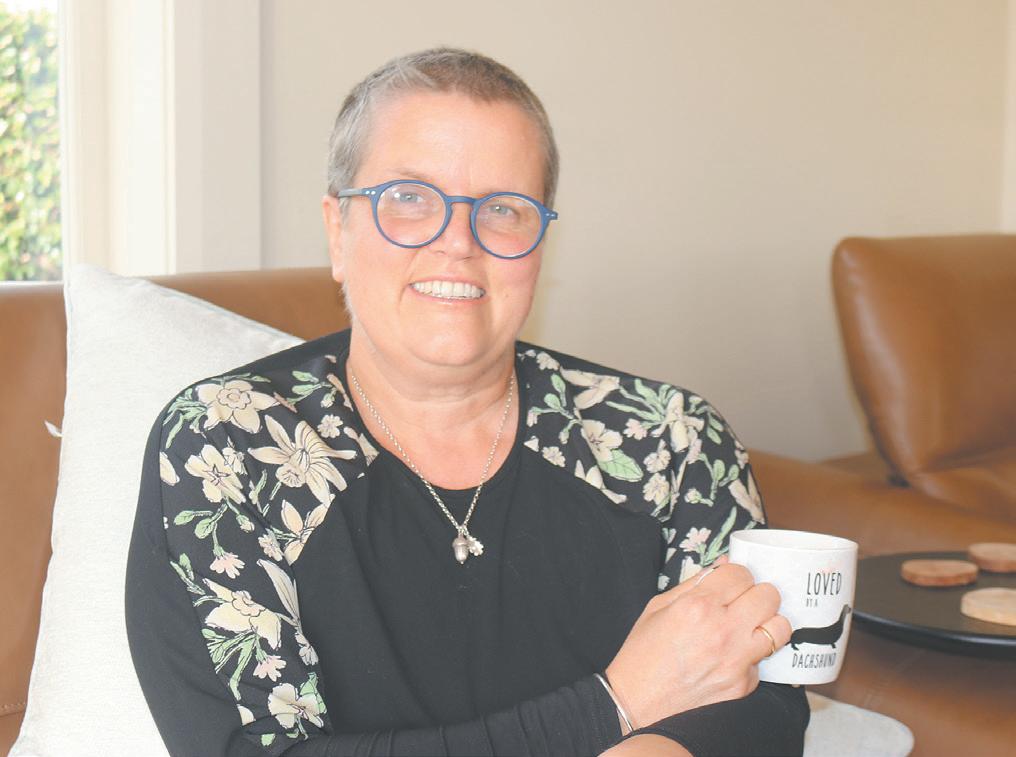
6 minute read
Interview: Doctor Heidi MacRae
Doctor Heidi MacRae could afford to pay for the drug needed to treat her aggressive cancer, but many aren’t so fortunate. She tells Helen Vause about facing serious illness – and speaking out for change.
Tough truths... Heidi MacRae was told the funded treatment options for her aggressive breast cancer were obsolete
Devonport GP Heidi MacRae headed into lockdown last August after many months immersed in all things Covid.
Alongside seeing her patients, as a board member of a primary health organisation (PHO), she was also flat out with the establishment of swabbing clinics, getting vaccinations to front-line staff, dealing with issues around PPE supplies and much more.
Her thoughts were far from her own well-being. As the long months of lockdown began, it was nowhere near business as usual for doctors anywhere.
Many regular procedures were being postponed, including MacRae’s mammogram due that month. It was rescheduled for December, just a couple of months away.
In the intervening weeks, her life was turned upside down by her own serious health event. Detection began with a routine staff temperature check at the Medplus surgery, which showed she had a fever.
In September, the hitherto healthy, vibrant 50-year-old was diagnosed with an uncommon form of breast cancer – known as triple negative – that is even more challenging to treat than other variants of the disease.
The course of action put to MacRae by her surgeon was blunt but clear: “My breast surgeon told me I did not have time to wait for public chemotherapy as I had such aggressive breast cancer.
“She also told me I needed to stop work immediately.”
Almost right away, MacRae also found herself facing some tough truths from her straight-shooting oncologist.
She was told that the treatment options funded in New Zealand are obsolete; if she wanted the gold-standard treatment for the best chance of survival, she’d have to fund it herself.
MacRae and her husband Tom were able to pay an eye-watering $7,800 every three weeks for the drug commonly known as Keytruda – a cost capped at around $69,000.
She holed up at home in Stanley Point, and worked through treatment with the support of friends and family.
Along the way, she reported via emails to her community and patients that she was very tired and had lost her hair, but she was handling treatment well.
Part of the many adjustments for her husband and children Hamish, Lachlan and Skye, were the household logistics that would keep her safe from Covid.
The boys, who were out of Auckland, couldn’t get back to be with their family anyway.
It would have been a rough time for anyone. But as a working GP, rendered a patient almost overnight, MacRae started to feel that her own cancer journey had some key aspects of luck to it.
For others diagnosed with triple-negative breast cancer, the story could be very different.
Some wouldn’t be able to get the best treatment urgently – or before it was too late.
She realised that she’d been fortunate to be able to access help fast and to be able to fund herself where needed. She wanted to be an advocate and she needed to start right now.
“And I guess I’m lucky that I’ve been able to do that. I’ve had a purpose beyond thinking about myself.”
Eight months after her diagnosis, and still receiving treatment, MacRae has spoken to media regularly, raising awareness of the grim realities of funding shortfalls and treatment options.
She also took to the keyboard, wanting to heighten public awareness that drug funding in New Zealand is “abysmal”.
She wrote, “I am upset about this injustice in New Zealand. All our people deserve healthcare that meets international standards, and all deserve equity of outcomes, not just the wealthy.”
She sat down to talk to the Flagstaff, a little reluctant to put herself back in the public eye, but keen to continue her advocacy work.
“The reality of our treatment here has been an eye-opener to me, and it’s difficult to know that other women in New Zealand aren’t getting the same chance that I have been able to get,” says MacRae.
“I’m now very aware that all over the country there are people begging and borrowing and doing anything they can to fund cancer treatments. They’re in desperate situations, running garage sales, turning to GiveaLittle pages to find large amounts of money and relying on the charity of others.”
Today, the GiveaLittle pages are one of the main funders for Kiwis of what is standard care overseas, MacRae says.
Although she has been unable to obtain data about patients seeking their own funding in New Zealand, MacRae fears it’s a high figure.
MacRae says New Zealand is “shamefully placed” for per-capita spend on modern medicines, and that many modern drugs, long available in other countries, are still sitting on the waiting lists for approval here.
She says Keytruda may not get approval for use in New Zealand for many years, if at all, and that the waiting list to fund prioritised modern medicines, which are already recommended for funding by Pharmac’s own clinical advisory panel, is growing. The average time an approved medicine stays on the waitlist is 4.7 years.
MacRae is not alone in her efforts to raise the alarm. Her thoughts aren’t news to the many bearing the consequences.
She says she’s not criticising government drug-funding agency Pharmac, who she says are buying the best and safest drugs they can with a very small budget.
“The problem is a political one.”
She dryly points out that her own letters to senior politicians have gone unanswered.
Successive governments have underfunded cancer treatments as the country has slipped down to 20th in OECD rankings.
On the campaign trail, Labour promised access to new cancer medicines, but has so far failed to deliver, MacRae says.
“Our health system, which I have devoted my life to working for, is not moving forward as fast as science produces life-saving solutions. We are being left behind and it is very frustrating to see what is happening and what’s available overseas.”
Her advocacy work has been a big part of her own road to recovery and, says MacRae, has brought her many new networks and friends who are on the same journey as her and trying to fight for change.
Of late, she’s been out and about much more, and was very happy to be able to make it to a Pink Ribbon breakfast in Parliament last week.
British-born MacRae came here with her New Zealand husband in 2001, and has become widely known by families all over the peninsula who have entrusted her with their healthcare.
But beyond the medical practice that she co-owns, she has also chaired the Comprehensive Care PHO and is still on its board.
She remembers feeling fit, healthy and near bulletproof just over a year ago when she’d received her first Covid vaccination.
Instead, MacRae found herself at home writing to her patients to provide a gentle version of what she was going through and how she was progressing.
More recently, she’s been able to tell them that she’s expecting to be back on deck around the middle of the year.
She has had a large volume of correspondence from her patients.
“That has been really, really lovely. But it’s also been pretty humbling too. As a doctor, I didn’t think about how people see you or what you mean to them.”
Not surprisingly, her cancer story has been a life-changer:
“My experience has made me appreciate the little things in life far more. I have always valued time with my family and friends, but now I treasure it even more. It remains to be seen how it changes me as a doctor.”







